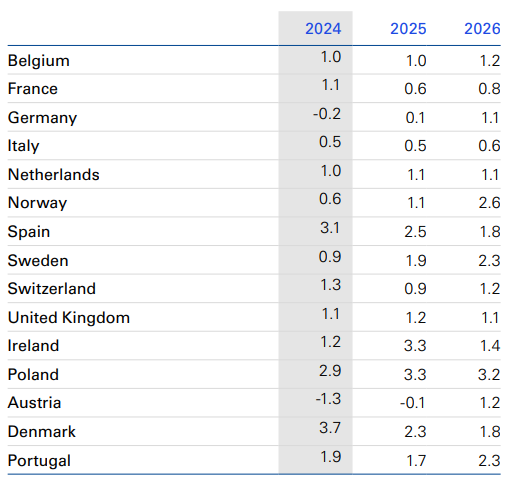KPMG sees Portugal growing almost twice as fast as the Eurozone in an economy threatened by trade tensions

The Eurozone economy is expected to grow 0.9% in 2025, with Portugal's gross domestic product rising 1.7% over the same period , according to a new study by KPMG. Although the consultancy firm's forecasts point to a "slight" recovery in eurozone countries, experts warn that the outcome of trade negotiations with the US, especially if they fail, could affect the European economy's performance.
"The high degree of uncertainty about the course of US trade policy creates a multitude of potential scenarios for the evolution of trade frictions , with the potential for both advantages and disadvantages for economies," warns the European Economic Outlook – Spring 2025 , prepared by KPMG, to which ECO had first-hand access.
The report anticipates a slight recovery of the European economy in 2025 and 2026, in an environment marked by “significant disparities between countries and sectors”.
The high degree of uncertainty about the course of US trade policy creates a multitude of potential scenarios for the evolution of trade frictions, with the potential for both advantages and disadvantages for economies.
According to KPMG forecasts, the Eurozone is expected to see modest GDP growth, estimated at 0.9% in 2025 and 1.1% in 2026, "reflecting a scenario of reduced economic dynamics", with countries such as Spain, Poland and Ireland benefiting from strong domestic demand , strategic investments and resilient labor markets, while economies such as Germany, France and Italy face structural and fiscal constraints that limit their growth potential.
Portugal will continue to stand out positively, with a GDP growth forecast of 1.7% this year and 2.3% next year.
"The evolution of the European economy is currently dependent on several factors, from trade relations with the US and how Europe will react to the evolution of tariffs on EU goods, to the evolution of various global conflicts. Several opportunities may arise from contexts like the one we are currently experiencing, including the expansion of European trade into new global regions, the creation of new sources of investment, and the reformulation of some value and supply chains, " says Miguel Afonso, Clients & Markets Partner at KPMG Portugal.
Portugal will continue to grow above average
The study highlights that the European economic environment continues to be pressured by a series of geopolitical uncertainties , including trade tensions with the US, fragmented industrial policies, and some volatility in the energy sector. These factors contribute to the loss of competitiveness in some economies and negatively affect the business environment.
Regarding trade policy, KPMG assumes a central scenario that assumes the European Union will reach a trade agreement with the US and will be able to maintain the 10% tariffs currently in effect.
"The failure of negotiations could give rise to a potential escalation of tariff measures, leading to the reimposition of reciprocal tariffs by the US," warns KPMG. The consultancy explains that it assumes a negative scenario that includes the imposition of a 25% tariff on US pharmaceutical imports worldwide , which would be particularly damaging to the economies of Switzerland and Ireland.
“This scenario could result in a 1.4% drop in the level of GDP in 2026 in Ireland, as well as a 0.5% drop in Switzerland, the Netherlands and Germany, compared to our main scenario, where tariffs remain at the current level of 10%,” it details.
In a “darker” scenario, in which “the EU faces a potential 50% tariff from the US, the impact is greater, so that the reduction to the GDP level in 2026 could range from 1.8% in Ireland to 0.6% in Spain.”
ECO-Economia Online





